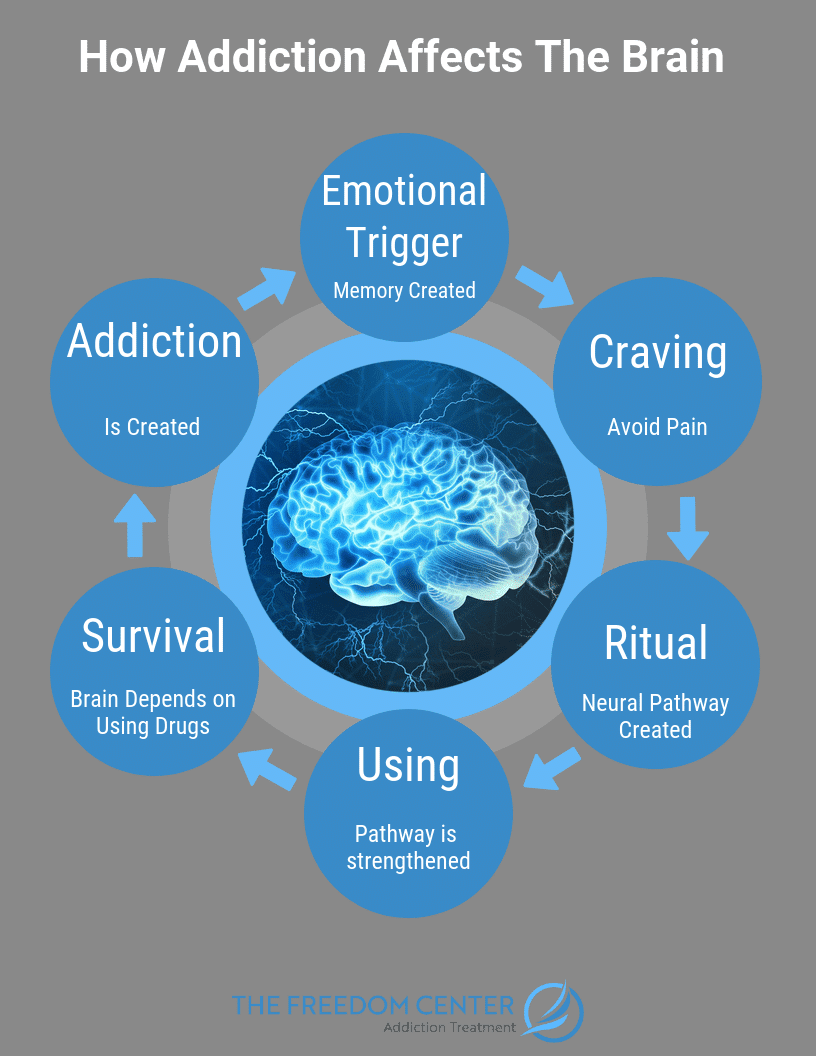The psychology of addiction is a complex puzzle with no easy answers. Is the condition a weakness, or is it a disease? How big a role do childhood and environment play? What is the effect of family history and genetics? Why can one person stop doing something that causes a pleasurable reaction when another continues even when they know it’s ruining their health, destroying their relationships, or emptying their bank account? Are the roots physical or emotional?
Who Is An Addict?
No one plans to become addicted to drugs or alcohol. Most people think it won’t happen to them when they take their first drink or pill. What starts as an escape from reality or a moment of pleasure turns in to an uncontrollable craving.
The National Institute on Drug Abuse (NIDA), a branch of the US Department of Health and Human Services, defines the disorder as a “chronic, relapsing brain disease characterized by compulsive drug seeking and use, despite harmful consequences.”
The Diagnostic and Statistical Manual of Mental Disorders, Fifth Edition (DSM 5) uses the term “substance use disorder” and labels the diagnosis as mild, moderate or severe, depending on the number of criteria met. For diagnosis, the condition must cause significant impairment, such as physical conditions, disability or failure to perform responsibly at home, school or work.
How Does It Affect The Brain?
The American Society of Addiction Medicine (ASAM) defines the disorder as a chronic disease that affects the circuits in the brain that involve motivation, memory and reward. ASAM distinguishes the disorder from a mere behavioral problem and labels the symptoms that define it:
- Impaired ability to control behavior
- Craving for the substance, object or activity
- Inability to stop the behavior in a consistent manner
- Lack of recognition of behavioral and interpersonal problems
A person who can’t turn down a drink even though they know it will cause problems with health, family and work is an addict. So is a person who can’t stop smoking when it’s damaging their lungs or one who can’t stop putting money into the slot machine when they know it is plunging them further into debt.
What Is At The Root Of A Substance Use Disorder?
Psychologists say emotional issues buried deep within the subconscious mind lie at the root of the disorder. It feels safer to turn to a substance than to face the overwhelming feelings that lie beneath the surface. The substance of choice eases the anxiety and makes it go away for a little while. There is a brief thrill with the roll of the dice or the emptying of the glass, but the bad feelings come back as soon as the substance goes away, creating the need for another hit.
Everyone has uncomfortable thoughts and feelings, but not all turn to unhealthy coping mechanisms to deal with them. At the heart of the problem is not the substance itself but the emotional discomfort that drives the unhealthy behavior. Long-term counseling is often recommended to reach hidden thoughts and prevent them from being acted out.
 What Is Emotional Regulation?
What Is Emotional Regulation?
Emotional regulation is a term that describes a person’s ability to manage his own feelings and behavior in a specific situation. This also includes the delay of inappropriate impulses and the management of physiological reactions like heartbeat or flight or fight response. In an ideal environment, a child learns this from his caregivers and knows he can count on help when he needs it.
When there is anger, neglect or inconsistent parenting, the child has no one to depend on. The outside world becomes a punishing, dangerous place, and he learns to rely on himself. The feelings of not being loved, wanted or cared for are hidden away, and the lack of connection leads to anxiety, depression or physical symptoms like insomnia and stomach aches. The child gets blamed and believes his invalidated feelings are his own fault.
The child keeps his feelings inside, hoping they will go away, but they never do. Drugs and alcohol do the job for a short time, but they are a quick fix. The relief is short-lived, and the need for another fix comes quickly. A tolerance gradually builds, and so does the need for bigger doses to bring back a state of euphoria.
What Is The Psychological Impact On The Brain?
Researchers who study the psychology of substance use disorder describe a three-step process.
- The process begins with strong feelings of helplessness.
- The feelings of helplessness lead to rage.
- The rage is displaced by an addictive behavior that takes its place.
The brain processes all pleasurable behaviors by releasing a neurotransmitter called dopamine. The process is meant to promote life-sustaining activities like eating or drinking water. Drugs produce the same response, but they cause the brain to overflow with up to 10 times more dopamine at a much faster rate than normal. This creates a cycle of highs and lows that contributes to cravings.
Addiction is a chronic condition that can be treated. The success rate is similar to physical conditions, such as asthma or diabetes. And just like those illnesses, recovering from substance abuse disorder requires lifetime maintenance.



 What Is Emotional Regulation?
What Is Emotional Regulation? 








































